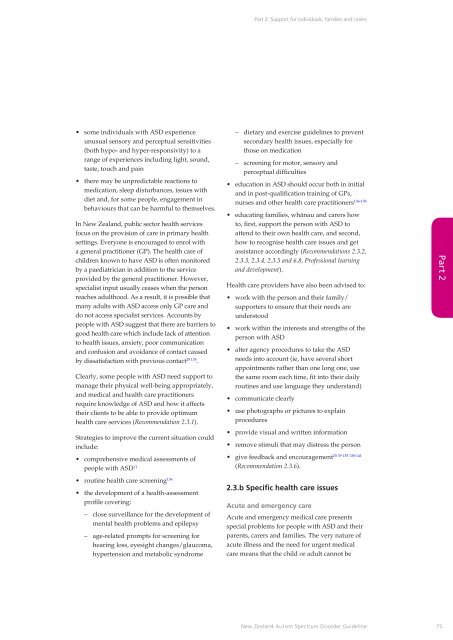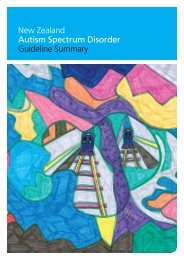New Zealand Autism Spectrum Disorder Guideline - Ministry of Health
New Zealand Autism Spectrum Disorder Guideline - Ministry of Health
New Zealand Autism Spectrum Disorder Guideline - Ministry of Health
You also want an ePaper? Increase the reach of your titles
YUMPU automatically turns print PDFs into web optimized ePapers that Google loves.
Part 2: Support for individuals, families and carers<br />
• some individuals with ASD experience<br />
unusual sensory and perceptual sensitivities<br />
(both hypo- and hyper-responsivity) to a<br />
range <strong>of</strong> experiences including light, sound,<br />
taste, touch and pain<br />
• there may be unpredictable reactions to<br />
medication, sleep disturbances, issues with<br />
diet and, for some people, engagement in<br />
behaviours that can be harmful to themselves.<br />
In <strong>New</strong> <strong>Zealand</strong>, public sector health services<br />
focus on the provision <strong>of</strong> care in primary health<br />
settings. Everyone is encouraged to enrol with<br />
a general practitioner (GP). The health care <strong>of</strong><br />
children known to have ASD is <strong>of</strong>ten monitored<br />
by a paediatrician in addition to the service<br />
provided by the general practitioner. However,<br />
specialist input usually ceases when the person<br />
reaches adulthood. As a result, it is possible that<br />
many adults with ASD access only GP care and<br />
do not access specialist services. Accounts by<br />
people with ASD suggest that there are barriers to<br />
good health care which include lack <strong>of</strong> attention<br />
to health issues, anxiety, poor communication<br />
and confusion and avoidance <strong>of</strong> contact caused<br />
by dissatisfaction with previous contact 25 135 .<br />
Clearly, some people with ASD need support to<br />
manage their physical well-being appropriately,<br />
and medical and health care practitioners<br />
require knowledge <strong>of</strong> ASD and how it affects<br />
their clients to be able to provide optimum<br />
health care services (Recommendation 2.3.1).<br />
Strategies to improve the current situation could<br />
include:<br />
• comprehensive medical assessments <strong>of</strong><br />
people with ASD 11<br />
– dietary and exercise guidelines to prevent<br />
secondary health issues, especially for<br />
those on medication<br />
– screening for motor, sensory and<br />
perceptual difficulties<br />
• education in ASD should occur both in initial<br />
and in post-qualification training <strong>of</strong> GPs,<br />
nurses and other health care practitioners 136-138<br />
• educating families, whänau and carers how<br />
to, first, support the person with ASD to<br />
attend to their own health care, and second,<br />
how to recognise health care issues and get<br />
assistance accordingly (Recommendations 2.3.2,<br />
2.3.3, 2.3.4, 2.3.5 and 6.8, Pr<strong>of</strong>essional learning<br />
and development).<br />
<strong>Health</strong> care providers have also been advised to:<br />
• work with the person and their family/<br />
supporters to ensure that their needs are<br />
understood<br />
• work within the interests and strengths <strong>of</strong> the<br />
person with ASD<br />
• alter agency procedures to take the ASD<br />
needs into account (ie, have several short<br />
appointments rather than one long one, use<br />
the same room each time, fit into their daily<br />
routines and use language they understand)<br />
• communicate clearly<br />
• use photographs or pictures to explain<br />
procedures<br />
• provide visual and written information<br />
• remove stimuli that may distress the person<br />
25 39 135 138-141<br />
• give feedback and encouragement<br />
(Recommendation 2.3.6).<br />
Part 2<br />
• routine health care screening 136<br />
• the development <strong>of</strong> a health-assessment<br />
pr<strong>of</strong>ile covering:<br />
– close surveillance for the development <strong>of</strong><br />
mental health problems and epilepsy<br />
– age-related prompts for screening for<br />
hearing loss, eyesight changes/glaucoma,<br />
hypertension and metabolic syndrome<br />
2.3.b Specific health care issues<br />
Acute and emergency care<br />
Acute and emergency medical care presents<br />
special problems for people with ASD and their<br />
parents, carers and families. The very nature <strong>of</strong><br />
acute illness and the need for urgent medical<br />
care means that the child or adult cannot be<br />
<strong>New</strong> <strong>Zealand</strong> <strong>Autism</strong> <strong>Spectrum</strong> <strong>Disorder</strong> <strong>Guideline</strong> 75











